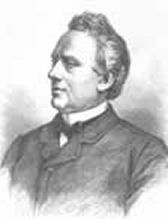Walthère Frère-Orban
| Walthère Frère-Orban | |
|---|---|
 |
|
| 11th Prime Minister of Belgium | |
|
In office 19 June 1878 – 16 June 1884 |
|
| Monarch | Leopold II |
| Preceded by | Jules Malou |
| Succeeded by | Jules Malou |
|
In office 3 January 1868 – 2 July 1870 |
|
| Monarch | Leopold II |
| Preceded by | Charles Rogier |
| Succeeded by | Jules d'Anethan |
| Personal details | |
| Born |
24 April 1812 Liège, France (now Belgium) |
| Died | 2 January 1896 (aged 83) |
| Political party | Liberal Party |
Hubert Joseph Walthère Frère-Orban (24 April 1812 - 2 January 1896) was a Belgian liberal politician and statesman.
He was born at Liège, received his education at home and in Paris, and began the practice of law in his native town. He identified himself with the Liberal party, and was conspicuous in the controversy with the Catholic clergy.
In 1846, he wrote the program, which was accepted as the charter for a liberal political party. In 1847 he was elected to the Belgian Chamber and appointed Minister of Public Works. and from 1848 to 1852 he held the portfolio of Finance. He founded the national bank of Belgium, reduced postage, abolished the newspaper tax and was a strong advocate of free trade.
His work, La mainmorte et la charité (1854–57), directed against the Conservatives, produced a great effect on the position of parties in Belgium. As a result, in 1857, the Liberals returned to power and Frère-Orban became once more Minister of Finance in the cabinet of Charles Rogier, whom he succeeded to become the 11th Prime Minister in 1868. In 1870 the Catholics regained their supremacy and forced him to retire, but from 1878 to 1884 he was again at the head of the cabinet, most notably breaking off diplomatic relations with the Vatican in 1880 (which were restored in 1884).
Standing as a liberal again in the October 1894 elections, he categorically refused the support of Catholics against progressives and socialists. He was not re-elected, defeated by the socialist Célestin Demblon.
...
Wikipedia
